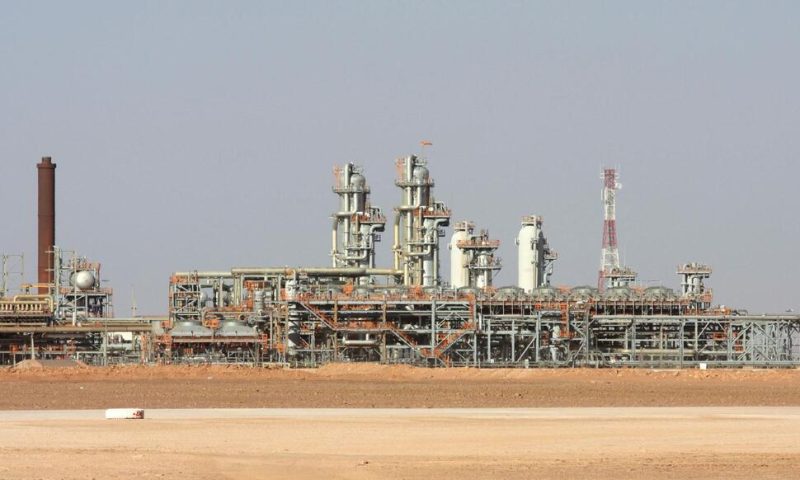Algeria has threatened to suspend its gas exports to Spain, the latest twist in a complex triangle of diplomatic tensions between the gas supplier, the gas importer and their shared neighbor Morocco.
MADRID — Algeria has threatened to suspend its gas exports to Spain, the latest twist in a complex triangle of diplomatic tensions between the gas supplier, the gas importer and their shared neighbor Morocco — all against the background of skyrocketing prices driven by Russia’s war in Ukraine.
Spain has been in talks with Morocco about helping the North African kingdom boost its gas supplies. That could possibly be done by allowing Morocco to use processing facilities in Spain that could handle imports by ship of liquified natural gas, which could come from a variety of suppliers. Gas could then be sent to Morocco via an existing pipeline that crosses the Strait of Gibraltar.
Spain, however, also imports natural gas from Algeria. And Algeria is in the midst of a deep diplomatic freeze with Morocco, with which it shares a land border. Algeria severed ties with Morocco last August. Then it choked off one of Morocco’s sources of gas by switching off a gas pipeline that runs across their shared border.
Morocco has turned to Spain for help in trying to make up the shortfall — a prospect that appears to be raising hackles in Algiers.
In a statement late Wednesday, Algeria’s energy ministry warned that gas supplies it sends to Spain via a separate pipeline under the Mediterranean could be suspended if the gas is then diverted elsewhere. Such a diversion could be regarded as a contract breach, “and, as a consequence, could lead to the breaking of the contract,” the ministry warned.
With Spain heavily dependent on Algerian gas, its energy ministry scrambled to calm the storm, saying in a statement that “in no case will the gas acquired by Morocco come from Algeria.”
Until last October, part of the supplies of Algerian gas to Spain came via the pipeline through Morocco. Morocco got a sliver of that supply, getting enough gas to produce 10% of its electricity. But the kingdom lost that energy source when the 25-year gas distribution agreement ended on Oct. 31, with Algeria refusing to renew it.
Algeria still sends gas to Spain through a second, longer pipeline direct from Algeria to Almería on Spain’s southeastern shore and in the form of LNG shipped in tankers.
But deprived of gas from its neighbor, Morocco has to go hunting much further afield.
Spain’s energy ministry said Morocco could acquire LNG on international markets and unload it at a re-gasification plant on the Spanish mainland. Once processed, the gas could then be exported to Morocco by sending it down the pipeline that, until October, used to carry Algerian gas up to Spain.
The Spanish ministry said the plans were devised after it was approached by Morocco for help in guaranteeing its energy security. The ministry said it had spoken to Algeria in past months about activating this mechanism and communicated its plans to Algeria’s energy minister on Wednesday.
Spain wants to strengthen ties with Rabat, a key player in the EU’s efforts to manage an increase in immigration from Africa northward.
The triangular tensions over gas come amid a broader international crisis over supplies and prices for the fossil fuel — driven by the war in Ukraine.
Major supplier Russia is using gas for leverage against countries that oppose its invasion of Ukraine. Russian state-owned energy giant Gazprom this week informed Poland and Bulgaria, both members of the European Union and NATO, that it is suspending their supplies. Polish and Bulgarian leaders accused Moscow of blackmail.
As European countries seek alternatives to Russian gas, supplies from Algeria have taken on added importance. Italy, which is also scrambling to wean itself off Russian energy, struck a deal this month to boost gas imports from Algeria. Spain is a leader in wind and solar power but continues to rely on energy imports — with Algeria providing more than a third of its natural gas.
The spat between Morocco and Algeria has forced Spain into a delicate balancing act.
The feud between Morocco and Algeria is largely rooted in the disputed region of Western Sahara, a former Spanish colony in North Africa that is rich in phosphates and borders fertile fishing grounds. It was annexed by Morocco in 1976.
Algeria backs the Polisario Front independence movement in Western Sahara. In March, it recalled its ambassador to Madrid in protest when Spain backed a Moroccan plan to give more autonomy to the contested territory.

